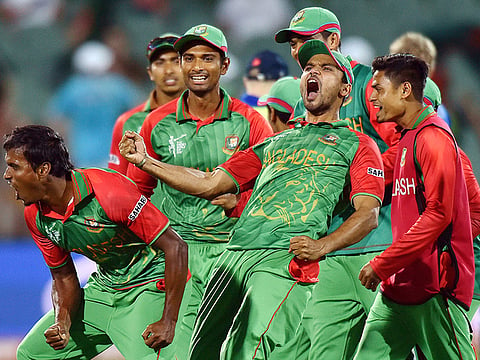Bangladesh boys usher in ‘free’ spirit of the game
Tigers showed they belong on the big stage by shocking England at World Cup

It may be difficult for some to agree with my perception, but I have often felt that it’s the upsets in any major sporting showpiece that stay with you. So no wonder it was the underdogs Bangladesh’s shock win over England that has captured the imagination of the fans — livening up the ICC World Cup as it heads for the business end.
A montage of frames stick with you from that magical afternoon in Adelaide — captain Mashrafe Mortaza sprawled on the ground at the fall of the last England wicket, the green wave at the stadium and the works. Back in Dhaka, who knows — patriotic fervor must have been in top gear, with strains of ‘O amar shonar Bangla’, their national anthem, filling the air.
The significance of the bandana that Mortaza wore at the presentation ceremony may not have been lost altogether, with an overwhelming presence of Bangladeshi fans at the stands as well as in his speech.
More than a style statement, it was reliving the image of the ‘Muktiyoddha’ (freedom fighters), who gave their lives to liberate East Pakistan to an independent country in 1971, and Mortaza took the opportunity to dedicate victory to those firebrands.
To say that the Bangladeshi fans are passionate or emotional about their team is an under-statement — it’s more of a common quality that binds the fans of the sub-continent. Success in sport has been a salve for any country struggling in the realms of economic deprivation and Bangladesh is no different — with the negative publicity that they often whip up with news of poverty, unemployment, religious bigotry and corruption.
It’s been fascinating to note how Bangladesh has metamorphosed — from a soccer-crazy country even up to the mid-1990s, to an important cog in the wheel in Asian cricket now. They have been hosts of a series of cricketing mega-events like the 2011 ICC World Cup, the last Twenty20 World Cup and a number of Asia Cups, apart from their regular fixtures on the Futures Tours Programme (FTP).
It’s been more than 15 long years since Bangladesh were accorded the status of an official Test-playing nation — a decision often criticised, with the team failing to do justice to their status. It’s not that the team hasn’t produced the odd quality cricketer, but they have given the impression of being more comfortable in the limited overs format rather than the longer version.
Back in the 2007 World Cup in West Indies, Bangladesh shocked a star-studded Indian team to spoil their party, while they came agonisingly close to winning the Asia Cup in 2012. However, the win over England was possibly the first occasion when they held their nerve in such a high stakes game to show they ‘belong’ to the big stage.
It will be sort of a miracle to expect them to cross the next hurdle in the quarter-finals. However, it will be a big plus if the success induces in them the right dose of confidence and self-belief to take their cricket forward.
Sign up for the Daily Briefing
Get the latest news and updates straight to your inbox



